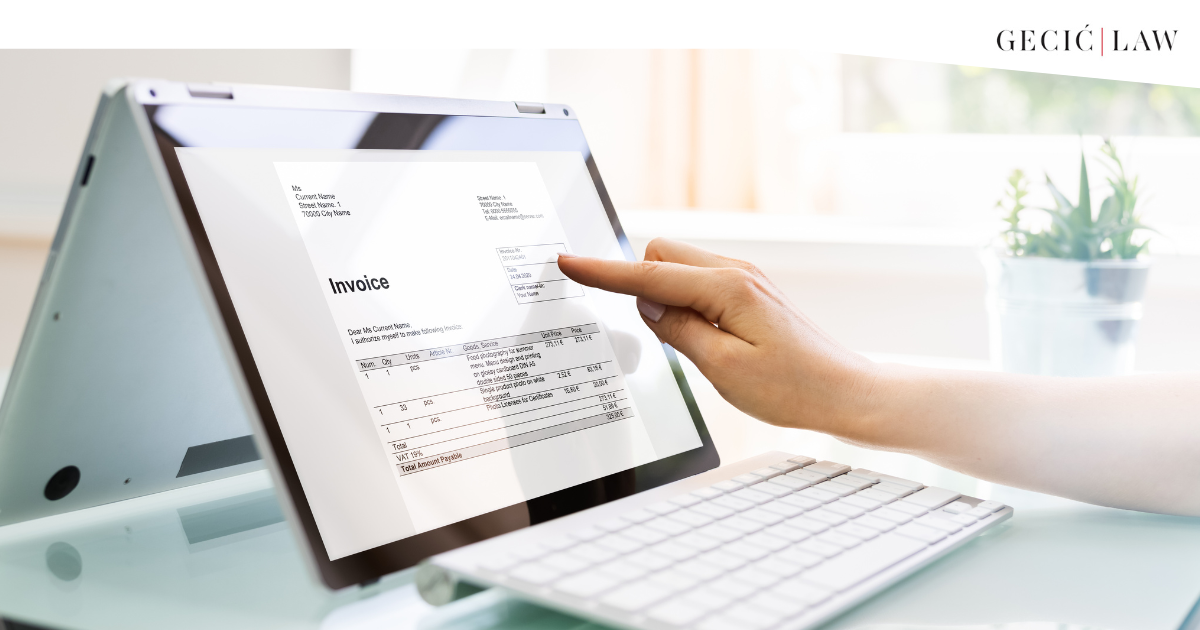

At the beginning of last year, the Electronic Invoicing Act (“Act“) was passed, which entered into force on May 7, 2021. Since the Act brought significant changes to the Serbian economy, the application of some provisions of the Act is postponed, so the latest set of provisions will apply from January 1, 2023. It is when VAT payers must start issuing electronic invoices in all mutual transactions with other VAT payers from the private sector and transactions with public sector entities. Even in the very first stage of this Act, Gecić Law gave an insight into which novelties we can expect.
The principal novelty of the Act is e-invoices as digital, dematerialized, and non-paper versions of invoices transferred through specially dedicated software from the issuer to the recipient of electronic invoices. Whether in paper or electronic form, an invoice is a document that is of great importance in everyday business both for the participants and for the tax authorities to calculate and collect taxes, for courts in litigations, and public enforcement offices in enforcement proceedings, i.e., the compulsory collection of claims. The latter is perhaps the most significant since the Act explicitly prescribes that the e-invoice is a credible document based on which authorities can initiate enforcement. The issuer or an intermediary (a legal entity licensed by the Ministry of Finance and registered in the competent register of intermediaries) must send the invoice to the recipient through a specifically designed system of electronic invoices.
In 2023, electronic invoices will therefore be used in transactions between:
Tax proxies of foreign-based entities in transactions with entities of both the public and private sectors must also issue e-invoices. Additionally, the Act creates the necessary preconditions and defines the parameters for the electronic invoicing system to be applicable and sustainable. It is essential to point out that within the private sector, electronic invoicing is mandatory only for VAT payers, which will significantly enhance complete and efficient control over VAT calculation and collection, and reduce the possibility of tax evasion, fraud, and other illegal actions.
For other legal entities that are not in the VAT system and self-employment income taxpayers, electronic invoices are only an option and not a legal obligation. Thus, self-employed taxpayers within the meaning of the Personal Income Tax Act and the taxpayers of corporate income tax in terms of the Corporate Income Tax Act can apply and use the system of electronic invoices at their discretion.
The introduction of electronic invoices consequently influenced changes to other relevant regulations. Accordingly, the Act on deadlines for settling monetary obligations in commercial transactions[1] was also amended. The amendments state the existence of electronic invoices (in addition to regular invoices), and economic entities are obliged by this law to deal with e-invoices.
To summarize, the final implementation phase of the electronic invoice system starts on January 1, 2023, when the complete application of the Act to private sector VAT taxpayers officially begins. Bear in mind that for non-compliance with the above (e.g., the company does not issue an electronic invoice, does not electronically report VAT, refuses to receive an e-invoice, etc.), the company may be fined for a misdemeanor between RSD 200,000 to 2,000,000.
[1] (“Official Gazette of RS,” no. 119/2012, 68/2015, 113/2017, 91/2019, 44/2021, 44/2021, 130/2021, 129/2021 – 138/2022)